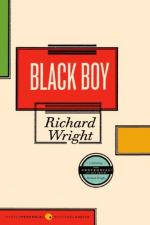|
|
Black Boy Author/Context
Richard Nathaniel Wright was born on a farm in Mississippi in 1908. He lived with his brother, born 1910, his mother, a school teacher, his father, a farmer; and his grandmother, who had been a slave before the Emancipation, became a nurse afterward, and was a devoted Seventh-day Adventist. His father deserted the family in 1913, and they fell into extreme poverty.
After moving around the South for several years, including a month spent in an orphanage, they moved in with Wright's Aunt Maggie, his mother's sister, in Elaine, Arkansas. However, when her husband was murdered by whites, they quickly moved to West Helena, Arkansas. His mother had a stroke, and Wright left school to earn money. By 1921, Richard was back in school, this time at a Seventh-day Adventist institution run by his youngest aunt, Addie.
He entered fifth grade in 1921 at a school in Jackson, Mississippi, but was quickly promoted to sixth grade. He worked briefly for a traveling insurance agent, and was disturbed by the poverty and ignorance he witnesses in the South. He worked various odd jobs for the next few years, reading voraciously. He published his first story, "The Voodoo of Hell's Half-Acre," in 1923. He graduated high school in 1924 as the valedictorian, and moved to Memphis, Tennessee. Soon after, his family joined him and he works several low-paying jobs there.
Moving to Chicago, he found urban life exciting and draining; he also observed less racism. Working in the post office and writing furiously, Wright made friends with artists and writers and various revolutionary thinkers, black and white. Falling in with the John Reed Club, an organization for such people, and the Communist party, he published various short stories in revolutionary literary journals. In 1939 he married Dhima Rose Meadman and finished "Native Son".
He slowly became disillusioned with Communism, mainly because of the party's desire to control his writing. He became involved with, then married, Ellen Poplar. He worked extensively with various playwrights and actors, including Orson Welles, to produce plays and music. His daughter Julia was born in New York in 1942. In 1943, He gave a speech to Fiske University about his experience with racism, and the strong reaction from the crowd incited him to write Black Boy. By 1946, the book was a success and he was living in Paris, meeting many of France's most prominent writers. He read deeply on the subject of existentialism, having long conversations with Jean-Paul Sartre. His daughter Rachel was born in 1949. He was published in anthologies with the likes of Arthur Koestler and Andre Gide, and traveled widely in South America. He worked for several years on his own existential novel, "The Outsider," a work influenced by Albert Camus. Meanwhile, he continued to support his family, who had moved back to Mississippi.
During the fifties, he grew alienated in Paris, as he was quietly critical of the Algerian war for independence. He was quite active politically, organizing the First Congress of Negro Artists and Writers in 1956.There were rumors that he was an agent of the FBI. In 1959, the year his mother died, he fell ill with amoebic dysentery. He continued to speak out against governmental control of artists and writers, especially racist control. Beginning with "Native Son," he was writing black literature that "refused to compromise with many white expectations." (Felgar 78) In November 1960, he died of a heart attack, and was cremated with a copy of Black Boy in Paris. He is remembered as the "virtual father of the post World War II black novel" (Felgar 175) and a mentor to anyone who despairs that his or her voice might never be heard.
Bibliography
Felgar, Robert. Richard Wright. Boston: Twayne Publishers, 1980
Wright, Richard. Black Boy. New York: Harper Collins, Perennial Classics Edition, 1998.




